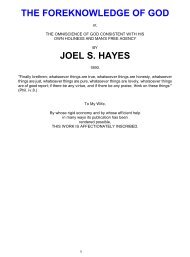Are Men Born Sinners? - Library of Theology
Are Men Born Sinners? - Library of Theology
Are Men Born Sinners? - Library of Theology
You also want an ePaper? Increase the reach of your titles
YUMPU automatically turns print PDFs into web optimized ePapers that Google loves.
e disciplined and purified. He taught that this estrangement <strong>of</strong> fallen spirits would some<br />
day come to an end, and all men would be saved. Even the devil and demons would<br />
someday be restored to God. Origen believed in a purgatorial fire where souls would be<br />
punished and prepared for the presence <strong>of</strong> God. In the end, all spirits in heaven and in<br />
earth including the demons, would be brought back to God, after having ascended from<br />
stage to stage through seven heavens. Origen believed that sin is rooted in the human<br />
nature <strong>of</strong> man. He believed that sin is a necessary consequence <strong>of</strong> man's material nature.<br />
Origen later assumed the existence <strong>of</strong> a sort <strong>of</strong> hereditary sin originating with Adam and<br />
added this idea to his belief in a preexisting fall. And he, like Augustine after him,<br />
supposed that there was an inherent pollution and sinfulness in sexual union.<br />
Augustine himself was deeply imbued with the heathen philosophies <strong>of</strong> his day. He first<br />
became a disciple <strong>of</strong> the Manichaeans. The Manichaeans were a Gnostic-Christians sect,<br />
with the Christian elements reduced to a minimum. They taught, among other things, that<br />
all matter is inherently evil. Because <strong>of</strong> this view, they also taught that Christ's bodily<br />
manifestations were only apparent, and that he did not actually come in the flesh. They<br />
denied the real incarnation <strong>of</strong> Christ, as well as his bodily resurrection, because <strong>of</strong> their<br />
view <strong>of</strong> the essentially evil nature <strong>of</strong> all matter. Augustine's nine years with them<br />
accustomed him to regard human nature as essentially evil and human freedom as a<br />
delusion.<br />
Augustine next fell under the influence <strong>of</strong> Neo-Platonism, and his theological views were<br />
strongly influenced by this philosophy as well. However, his doctrine <strong>of</strong> sin shows the<br />
obvious influence <strong>of</strong> the Gnostic teachings <strong>of</strong> Manichaeism, in which he assumes the<br />
most ridiculous teaching <strong>of</strong> all the heathen philosophies the teaching that matter can be<br />
sinful. And this is the source <strong>of</strong> his doctrine that sin can be passed on physically from one<br />
person to another. Harnack says:<br />
We have, finally, in Augustine's doctrine <strong>of</strong> sin a strong Manichaean and Gnostic<br />
element; for Augustine never wholly surmounted Manichaeism.<br />
Albert Henry Newman also remarks:<br />
Augustine, the greatest <strong>of</strong> the Latin Fathers, was for many years connected with the<br />
Manichaeans and his modes <strong>of</strong> thought were greatly affected by this experience.<br />
Augustine's doctrine <strong>of</strong> sin, with his belief in the inherent sinfulness <strong>of</strong> the physical<br />
constitution, is wholly Manichaean. His idea that sin is propagated through the marriage<br />
union, that sexual desire is sin and that sexual lust in procreation transmits sin is also<br />
Manichaean. Augustine built his doctrine <strong>of</strong> original sin upon this premise that sexual lust<br />
in procreation transmits sin. Harnack says:<br />
The most remarkable feature in the sexual sphere was, in his view, the involuntariness <strong>of</strong><br />
the impulse. But instead <strong>of</strong> inferring that it could not therefore be sinful and this should<br />
have been the inference in keeping with the principle "omne peccatum ex voluntate" he<br />
rather concludes that there is a sin which belongs to nature, namely, to natura vitiata, and






